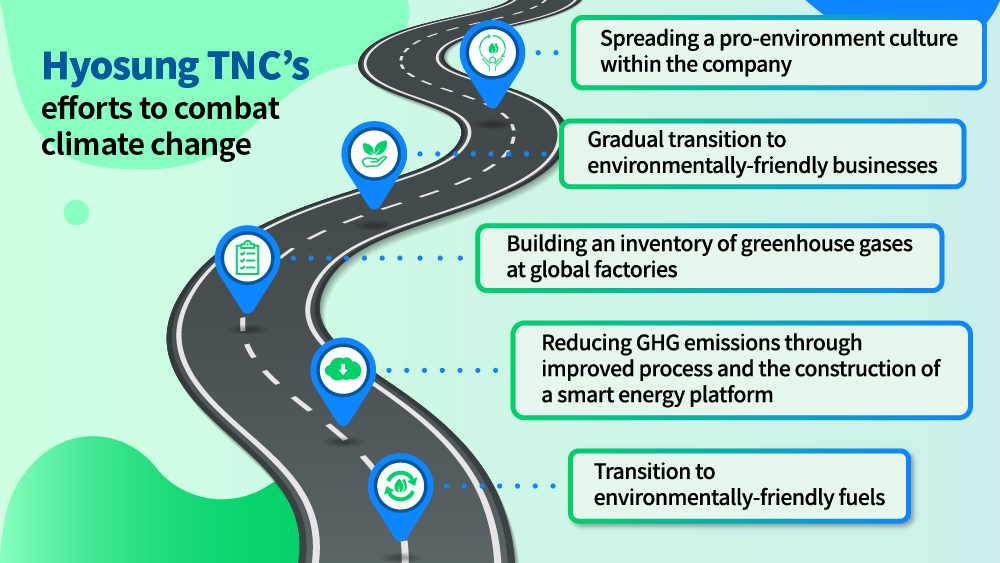Together, for better value: Our efforts to combat climate change!
2023.04.21
Mankind and nature have always coexisted. Nature has always been an integral part of human existence and humans have been a part of nature’s history. Because mankind cannot exist without nature, mankind must find a way to coexist and prosper with nature.
In order to create a natural environment where sustainability is guaranteed, the ability of individuals, enterprises and the world to coexist, the value of ‘togetherness’ is now more important than ever before. Many people around the world today are working feverishly to combat climate change on multiple fronts. All these human efforts are being made for the sake of one goal: ‘the coexistence of mankind and nature’. This goal is the very definition and objective of ‘living well together by helping each other’. There is a company that practices this value of ‘togetherness’, the very meaning of coexistence. That company is Hyosung TNC!
According to the UN, the fashion industry is responsible for about 8-10% of CO2 emissions, the main cause of climate change. Hyosung TNC, which manufactures textile yarns for the fashion industry, is the world’s top maker of spandex. As a responsible member of the industry, the company has been introducing many types of eco-friendly products over the years with the hope of contributing to the mitigation of the climate change crisis. The brand that symbolizes the company’s efforts in this regard is regen®, a recycled yarn brand. To produce and supply regen®, Hyosung is collaborating with a slew of fashion companies and organizations and creating the value of mutual growth.
regen® is not the only example of the sustainability drive being pursued by Hyosung TNC. Hyosung TNC is ceaselessly researching new ways of reducing carbon emissions throughout the lifecycle of its products. Today, we at Hyosung TNC intend to fully disclose the details of our environmental activities.

Transition to environmentally-friendly fuels
Hyosung TNC’s factories were able to reduce their greenhouse gas emissions significantly after switching to low carbon energy sources. The factories receive waste heat (a renewable energy source) from nearby household waste incineration centers, after which biogas generated by the anaerobic digestion tank of the wastewater treatment plant is fed into the boilers.
The company’s Gumi factory has reduced its greenhouse gas emissions by replacing B-C oil with LNG and LPG gas. Until recently, B-C oil was widely used in the manufacturing sector because it was cheap and had high energy efficiency, but it was blamed for polluting the environment because it produced diverse pollutants including soot. Therefore, the Gumi factory gradually increased the substitution of B-C oil, the source of so many pollutants, and reached a milestone in November 2019 when it stopped using it completely. Hyosung TNC is paving the way forward as a global leader that considers the value of the environment, rather than as one that thinks only about minimizing costs to boost efficiencies.
1) Reducing GHG emissions through improved processes and the construction of a smart energy platform
The environmental investment plan for each factory is the one thing that Hyosung TNC never forgets to prepare every year. The company is dedicated to reducing carbon emissions through energy savings that are concretized in the yearly environment investment plans. Every year, Hyosung implements the environment investment plan thoroughly and strictly according to the schedules set forth in the plan. Manufacturing processes are improved to cut down on energy usage rates, while equipment like motors, freezers and air compressors are replaced with high efficiency ones.
In addition, in 2020, Hyosung TNC’s Daegu factory participated in the ‘Seongseo Industrial Complex Smart Energy Platform Construction Project’ launched by the Korea Industrial Complex Corporation. In this project, twenty instruments were installed in facilities that consume large amounts of electricity, and a Factory Energy Management System (FEMS) was set up in the factory. The FEMS is a system that enables energy to be used effectively in a factory thanks to the application of information communication technologies and computing software. It analyzes how much energy is used by a particular facility, forecasts the level of energy demand, and calculates the appropriate energy usage rate and costs. With the deployment of the FEMS, Hyosung TNC is able to operate its facilities more efficiently because it can determine in real time where and when energy is used and then make adjustments to the amount of energy to be supplied.
2) Building a GHG inventory at global factories
Depending on the nature and scope of emission rates, greenhouse gas emissions can be classified into Scope 1 (direct emissions), Scope 2 (indirect emissions), or Scope 3 (other emissions). Hyosung TNC not only monitors and manages the scope 1 greenhouse gases directly emitted by its factories, but also manages indirectly emitted scope 2 greenhouse gases.
To build an inventory of greenhouse gases at its global factories, and not just its factories in South Korea, the company calculates scope 1 and scope 2 emission rates at the factories run by its subsidiaries in China (Hyosung Spandex Jiaxing Co. Ltd.), Republic of Türkiye (Hyosung Istanbul Tekstil Ltd.), and Vietnam (Hyosung Dong Nai Ltd.).
In the case of its domestic factories, Hyosung TNC even calculates its scope 3 emission rates (i.e. emissions across the entire value chain) voluntarily and reports the data to the Carbon Disclosure Project (CDP). With the aim of building greenhouse gas inventories and controlling the emission rates of all its global factories, the company is planning to gradually introduce the calculation of scope 3 emission rates to its other factories. By managing indirect emission rates and emission rates at its overseas subsidiaries, Hyosung TNC is working hard to reduce greenhouse gas emissions.
3) Gradual transition to environmentally-friendly businesses
As mentioned earlier, Hyosung TNC is a global fabric producer that supplies, in close collaboration with global fashion brands, environmentally-friendly yarns made from recycled materials which are sold under the brand name regen®. Through ceaseless research and development activities, the company is also introducing an entire product lineup that will expand the functionalities of regen®-based products. For example, it supplies recycled yarn made from post-consumer waste materials (waste materials discarded by end consumers) such as PET bottles and used fishing nets, and pre-consumer waste materials (waste materials generated before a product reaches the consumer), with the latter being a by-product of the manufacturing process. Recycled yarns not only help to reduce the amount of waste buried in landfills, but also lower the use of petroleum resources during the production of normal yarns, which in turn naturally aids the environment because lower petroleum resource usage means lower carbon dioxide emissions and energy usage. Hyosung TNC is also leading the pro-environmental movement of the industry by manufacturing bio-based products, which require less water and generate less carbon than conventional yarns and are made from non-edible ingredients.
4) Spreading a pro-environment culture within the company
In 2021, Hyosung TNC’s main office in Mapo-gu launched a campaign to reduce the use of disposable products that are indiscriminately used and thrown away in the office. This campaign involved the participation of all executives and employees working at the main office. Today, employees use their own personal tumblers (slightly less handy but longer lasting) rather than the disposable paper cups. By using personal tumblers as a substitute for easy-to-discard paper cups, the company anticipates that this will translate into a greenhouse gas emission rate reduction of around two tons per year, while costs can be saved for roughly 190,000 paper cups that were used in the main office each year.
Another notable campaign is the ‘Internal campaign to reuse regen’ launched in 2022. For this campaign, which is now in its second year of operation, special bins have been installed in the company’s main office building in Mapo-gu to collect discarded PET bottles, which are then recycled and used as a material for making environment-friendly fashion items for distributing to employees. The PET bottles discarded in the office are also collected and recycled as Hyosung TNC’s environmentally-friendly regen® polyester yarn, which is used to make bags and t-shirts for the employees. In 2022, 8,831 PET bottles were collected - an effect equivalent to 37 pine trees absorbing carbon dioxide for thirty years. The campaign is continuously improving the brand awareness of regen®, the company’s flagship environmental brand, as well as cultivating a positive mindset among employees regarding their personal participation in the recycling of resources.
Hyosung TNC also organizes an annual ideas contest with the aim of finding novel ways to reduce energy consumption and greenhouse gas emissions, in the hopes that increased awareness of the issue among employees could lead to deeper cuts in the company’s carbon dioxide emission rates. This ideas contest has produced some tangible results. For example, Hyosung TNC’s Nylon Polymerization Team at the Ulsan factory proposed the innovative idea of raising the production density of thickeners in the recovery process to reduce the use of energy. If this idea is realized, greenhouse gas emissions could be reduced by up to 8 tons in a single year, which is a big motivator for Hyosung TNC to review this idea in earnest.

We live in an era of rapidly changing times and trends which inevitably lead to the production of huge amounts of disposable items, trash, and fast fashion (SPA). The resulting pollution poses a threat to the health not only of everyone now living on Earth but also to future generations of mankind.
As if the pollution of land is not enough, the plastic waste that seeps into the oceans is creating huge offshore islands, and as the plastic exposed to sunlight cools, it discharges greenhouse gases. These greenhouse gases then reflect the sunlight back to the surface of the earth, making our world even hotter. After floating on the seas for a long time, waste materials eventually disintegrate into tiny pieces, which are then eaten by sea creatures who mistake them for food, with often disastrous consequences. Ultimately, these waste materials pass through the food chain and end up in the bodies of humans.
This is a major problem that cannot be resolved through the efforts of one person or one organization alone. The problem requires the interest of the wider international community and commitment and efforts from all of us. This is why Hyosung TNC, as the world’s top producer of spandex, seeks to play an active role in tackling the problem with a sense of responsibility. In tune with its reputation as a global top player, Hyosung TNC will design a sustainable future for all generations based on its environment-oriented business, so that everyone can welcome a future in which they can live safely in a clean environment.
At every moment, Hyosung TNC considers sustainable progress for all generations, present and future. Indeed, the choices we make as a business will always place “togetherness” in our pursuit of valuable customers like you who yearn for a brighter future.